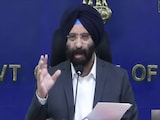Chief Ministers always come and go. But the real importance of the resignation of Captain Amarinder Singh lies less in what it means for Punjab politics, and more in what it tells us about the Congress party of today. With each passing day, it becomes clearer and clearer that this is not the Congress that won power in 2004 and 2009, but another party entirely.
The first difference is in the way Amarinder Singh was treated. Singh is a Congress veteran who not only won Punjab for the party but is nationally respected. When complaints started coming in about his leadership - claims that he was inaccessible to his MLAs, that governance had been outsourced to bureaucrats, that he had done nothing to fight anti-incumbency etc. - the party would have, once upon a time, assessed whether there was any truth to these claims.
If it found that there was some basis to the charges, Sonia Gandhi would have assigned a senior aide (probably Ahmed Patel) to talk to the Chief Minister, and to ask him to immediately take corrective steps in the interests of the party.
The Congress leadership did not bother to do that this time because Ahmed Patel is dead, nobody else is playing that role, and anyway, that is not how the party functions now.
Amarinder Singh told Sonia Gandhi that he was resigning because he could not bear to be humiliated this way.
The second difference is the way in which dissidence is handled. All Chief Ministers have dissidents. Often these dissidents are powerful or well-known. In the old days, the dissidents would have been given a chance to talk to the Congress President's top aides and then been offered a brief meeting with Sonia Gandhi. They would have felt that they had been heard, and yet nothing would have been done to embarrass the sitting Chief Minister. In the case of Punjab, the perception grew that the party leadership was actually encouraging and nourishing one particular dissident: Navjot Singh Sidhu. He bragged about his access to Priyanka Gandhi (and through her to Rahul Gandhi) and used his proximity to her to convince MLAs that he was the leader of the future and that the Chief Minister was a goner.
Never before, in the 40 or so years that I have watched the Congress, has the central leadership seemed so openly willing to take sides in an internal battle in a Congress-ruled state. That was never the Congress's way. But, it is how things are done now.
A third difference: all Congress Presidents have to sack Chief Ministers at some stage. There is no other alternative. But nearly always, it used to be done face-to-face, or through a trusted, senior aide (like Ahmed Patel). The outgoing Chief Minister would be told that the party bore him no ill-will and that it would find him something else to do.
Contrast this with Amarinder's exit. MLAs were encouraged to write letters of complaint about him. Late one night, a meeting of the legislature party was suddenly called for the next day without the Chief Minister being informed. Sidhu gleefully tweeted about the meeting. The press was told, through leaks, that this was it for Amarinder.
It has never before been the Congress way to sack a Chief Minister though conspiracy and subterfuge. When he realized what was going on, Amarinder called Sonia Gandhi at 10am and said that he was resigning because he could not bear to be humiliated this way.
Navjot Singh Sidhu used his proximity to Priyanka Gandhi (and through her to Rahul Gandhi) to convince MLAs that he was the leader of the future.
Here's a fourth difference: all high commands have always retained the right to sack Chief Ministers. But when they remove them, they do not search for some bogus legitimacy. For instance, when Narendra Modi removed Vijay Rupani as Chief Minister of Gujarat, he did not bother to give excuses. Nor did Sonia Gandhi when she acted against Congressmen in the past. But this time, the leadership searched for desperate justifications. If Amarinder was so popular, the Congress apologists asked, how come 78 MLAs attended the meeting of the legislature party? Did this not prove that all MPs wanted him sacked? (Actually, it proved no such thing, but that is a different argument.) Never before has there been such a scramble to win a dodgy legitimacy for a decision.
The fifth and crucial difference: why does the Congress leadership now need to operate through stealth and conspiracy? Why does it need to search for a bogus legitimacy for its decisions? The answer may have to do with the lack of legitimacy that envelops the current leadership. Priyanka Gandhi is General Secretary in charge of UP. She has no locus standi on Punjab matters. Rahul Gandhi resigned as Congress President after the Lok Sabha debacle. He has no official legitimacy at all. Both siblings are where there are today because of birth. Unlike their mother who led the Congress to two electoral victories, neither has any kind of electoral record to be proud of.
This is a major shift for the Congress whose leaders have always been obsessed with legitimacy. When Rajiv Gandhi was asked to take office in 1991 on the basis of the majority that the Congress enjoyed through its alliance with Chandrashekhar's party, he refused and opted to seek a mandate at a general election. When doubts were raised about Sonia Gandhi's status as an an MP because she may have occupied an office of profit, the Manmohan Singh government prepared an ordinance that would have got her off the hook. Sonia turned down that easy option, resigned her seat and opted for a fresh election. Legitimate leaders function in the clear light of day. Those whose democratic credentials are suspect function better under cover of darkness.
The differences go on. Here is number six. Sonia Gandhi has always preached patience. When Jyotiraditya Scindia wanted to be Chief Minister of Madhya Pradesh, he was told to wait because Kamal Nath was much older. Sachin Pilot was told the same thing about Ashok Gehlot. But nobody asked Sidhu to wait. Instead, they spread the word that Amarinder (who is only a little older than Kamal Nath) was too old for the job.
And seven: Sonia Gandhi has always believed in the idea of India. She has, quite correctly, regarded Congressmen who switch to the BJP as people betraying their ideology. The BJP, she has often said, stands against every principle this country was built on. So why is it that Sidhu, who spent his political career in the BJP before joining the Congress just before the last election, suddenly became so worthy of promotion? Does ideology not matter in this avatar of the Congress? And if Amarinder does yield to the BJP's seductions, will the Congress have any moral right to complain?
These are troubling questions. And they have never been satisfactorily answered. None of this is to say that the old way was better. Or that the new way is necessarily wrong. That is a matter of individual opinion. But what's indisputable is this. The old way raised the Congress from the ashes and kept it in power for ten years. The new way has resulted in two electoral debacles with little hope of redemption.
(Vir Sanghvi is a journalist and TV anchor.)
Disclaimer: The opinions expressed within this article are the personal opinions of the author. The facts and opinions appearing in the article do not reflect the views of NDTV and NDTV does not assume any responsibility or liability for the same.














